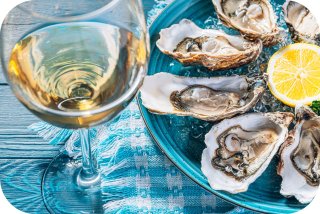Why am I being warned about potential exposure to certain chemicals in foods and beverages?
- Some foods and beverages contain chemicals that are on the Proposition 65 list for cancer or reproductive toxicity.
- California’s Proposition 65 requires businesses to warn people before exposing them to a significant amount of a chemical listed under Proposition 65 for cancer or reproductive toxicity.
- A court has decided that businesses do not have to warn about exposure to acrylamide in food. However, people can still take steps to reduce their exposure to this chemical.
Some foods and beverages may expose you to some chemicals on the Proposition 65 list.

These chemicals may be present in certain foods and beverages you prepare at home or purchase at a grocery store. They may also be found in certain foods and beverages sold or served by restaurants and other food facilities.
This does not mean that these foods and beverages should never be consumed. However, you may choose to reduce your exposure by limiting how often and how much of them you consume.
The Proposition 65-listed chemicals commonly found in foods and beverages are:
- Mercury, a metal that can accumulate in certain types of fish and seafood.
- Fish that tend to have the highest levels of mercury include: king mackerel, shark, tilefish (from the Gulf of Mexico), swordfish, marlin, bigeye tuna, bluefin tuna, and orange roughy.
- Other types of fish include black bass species (such as largemouth bass), striped bass, pikeminnow, and white sturgeon.
- Alcoholic beverages. These can increase cancer risk and, when consumed during pregnancy, can cause birth defects.
- Lead, a metal found in some dietary supplements, balsamic vinegars, and imported spices such as cinnamon and turmeric. In the past, some imported candy, including some products with chili and tamarind, have had significant amounts of lead.
- Arsenic (inorganic), a naturally occurring chemical element in the Earth’s crust.
- Some plant crops such as rice can absorb arsenic. When rice is grown in soil with elevated arsenic levels, the amount of arsenic in the rice can be elevated.
- Some herbal medicines from India and China may contain arsenic.
- Some edible seaweed (especially hijiki, a short, black, noodle-like seaweed) can absorb arsenic from water.
- Cadmium, a metal found in certain fish, shellfish, and organ meats. Some leafy vegetables like spinach, grown in cadmium-rich soils, take up cadmium.
- Di(2-ethylhexyl)phthalate (DEHP), a type of phthalate added to many plastics to make them flexible. DEHP has been found in some foods that have been in contact with plastics during processing and packaging, because it can be gradually released into certain foods and beverages.
- Acrylamide, a chemical formed in some plant-based foods during cooking or processing at high temperatures, such as frying, roasting, grilling, and baking. In general, the browner the surface, the higher the level of acrylamide.
- The highest amounts of acrylamide are often found in french fries and potato chips.
- Acrylamide can also be found in other fried snack foods, canned sweet potatoes and pumpkin, canned black olives, roasted nuts, roasted grain-based coffee substitutes, prune juice, bread crusts and toast, certain breakfast cereals, crackers, cookies, and baked snack foods.
- Acrylamide levels can vary among different kinds of foods and even among different brands of the same kind of food. Many foods have low levels of acrylamide that do not pose a significant cancer risk.
- Bisphenol A (BPA), a chemical is used in some coatings for cans, jar lids, and bottle caps. BPA is also used in some polycarbonate plastic bottles and other food contact items. However, the use of BPA in these items is decreasing.
- BPA can leach into food or beverages from BPA-based linings in metal food and drink cans, jar lids, and bottle caps.
- BPA is found in some plastic water bottles, water cooler bottles, dishes and utensils, cookware, food storage containers, and electric kettles. Using these products can cause BPA to enter the foods and beverages.

How can I reduce my potential exposure to Proposition 65-listed chemicals in foods and beverages?
- Select fish and shellfish wisely. Choose types that are lower in mercury, such as salmon, trout, tilapia, cod, sole, sardines, shrimp, oysters, and other shellfish.
- Pregnant women and young children should be especially careful not to consume more than the recommended daily amount of fish that may contain mercury.
- When consuming fish caught from California water bodies and coastal areas, follow OEHHA sport fish advisories and safe eating guidelines.
- Limit your consumption of shellfish and certain animal organ meats (liver and kidney) to moderate amounts.
- If you choose to drink alcohol, do so in moderation. Alcohol increases your risk for cancer.
- If you are pregnant or trying to become pregnant, do not drink alcohol.
- There is no known safe amount of alcohol one can drink during pregnancy.
- All types of alcoholic beverages can harm a developing baby, including wine and beer.
- Include alternatives to rice-based foods in your infant’s diet.
- Check federal and state websites that monitor levels of lead in imported candy and spices.
- Eat a well-balanced diet with adequate calcium, iron, and vitamin C, which can help reduce the amount of lead your body absorbs.
- Eat more fresh foods, rather than processed or canned food products.
- In restaurants or other food facilities, try to order fresh, rather than packaged, foods and beverages, where possible.
- Ask your server for help choosing fresh menu items.
- Limit your consumption of heavily fried and grilled foods.
- For example, choose or prepare mashed potatoes instead of french fries.
- When cooking at home, fry foods at temperatures of 170 degrees Celsius (338 degrees Fahrenheit) or less. In particular, cook potato strips such as french fries to a golden yellow rather than a golden brown color. This will reduce the formation of acrylamide.
- Store food and liquids in glass or stainless steel containers, rather than plastic ones.
- Avoid using polycarbonate plastic containers and tableware for hot food or drinks, and avoid microwaving foods in polycarbonate plastic containers.

For more information:
General Fact Sheets and Resources
- California Department of Public Health (CDPH)
- National Institutes of Health (NIH)
- US Environmental Protection Agency (US EPA)
- US Food and Drug Administration (FDA)
- Centers for Disease Control and Prevention (CDC)
- New York City Department of Health and Hygiene
Proposition 65
- California Environmental Protection Agency (CalEPA)
Office of Environmental Health Hazard Assessment (OEHHA)- Proposition 65: Background
- Proposition 65: The List of Chemicals
- Proposition 65: Fact Sheets
Related Chemical(s)
Related Product or Place
References
Product/Place
